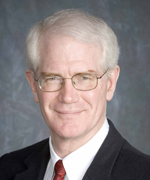Gary J. Miller, PhD, who conducts experimental research on the politics of organizations, including decision-making in bureaucracies, committees and small groups, and John C. Morris, MD, an internationally renowned researcher of Alzheimer’s disease and other neurological disorders associated with aging, will receive Washington University’s 2010 faculty achievement awards, Chancellor Mark S. Wrighton announced.
Miller, professor of political science in Arts & Sciences, is the recipient of the Arthur Holly Compton Faculty Achievement Award, and Morris, the Harvey A. and Dorismae Hacker Friedman Professor of Neurology, is the recipient of the Carl and Gerty Cori Faculty Achievement Award.
They will receive their awards and give presentations of their scholarly work during a ceremony in December.
“Washington University is fortunate to have outstanding faculty on both its Medical Campus and Danforth Campus,” Wrighton says. “It is wonderful to see special recognition coming to Professor Morris of the Department of Neurology, a leader in developing an understanding of Alzheimer’s disease and its treatment, and to Professor Miller, a leader in our Department of Political Science in Arts & Sciences and earlier in the John M. Olin School of Business.
“Celebration of the Cori and Compton Faculty Achievement Awardees in a special ceremony on Dec. 4, 2010, brings our entire faculty together to recognize the importance of outstanding contributions in education and research by our faculty,” Wrighton says.
Gary Miller
Miller, a member of the WUSTL faculty since 1986, has been widely published in leading journals for more than 20 years and is the author of several books on political economy.

Supported by three grants from the National Science Foundation, his research puts cutting-edge rational choice theories to the test in lab settings, helping to refine and improve these theories while suggesting new directions for further research.
In 2004, his work on party realignment (with Norman Schofield, LittD, PhD) earned honors as American Political Science Review’s best paper on political organizations. His work on the role of bureaucracy in a separation of powers constitutional regime earned the 2005 Herb Simon Award for contributions to public administration.
Current projects include studies of senate negotiation processes and experimental research on incentive negotiations.
Miller earned a bachelor’s degree in political science from the University of Illinois at Urbana-Champaign in 1971 and a doctorate from the University of Texas at Austin in 1976. He then taught three years at California Institute of Technology and five years at Michigan State University.
He began teaching at WUSTL in the Olin Business School and served as the Reuben and Anne Taylor Professor of Political Economy from 1988-1997. He then moved to Arts & Sciences as a professor of political science and served as director of graduate studies from 1999-2001.
His teaching spans the politics of the U.S. bureaucracy, the U.S. Congress, community decision-making, interest groups, mathematical modeling and the Civil Rights movement, including a course on writing about civil rights. He has taught graduate business courses at WUSTL and for many years at the U.S. Business School in Prague, Czech Republic.
Miller’s work with students has been recognized with numerous teaching awards, including the Burlington Northern Foundation Award for Excellence in Undergraduate Education in 1990 and the university’s Distinguished Faculty Award in 1994.
His mentoring has won four special recognition awards from graduate students, including WUSTL’s Outstanding Faculty Mentor Award in 2004.
John Morris
Morris earned a bachelor’s degree at Ohio Wesleyan University in 1970 and a medical degree at the University of Rochester School of Medicine and Dentistry in 1974.

Morris
After completing residencies in internal medicine and neurology, Morris came to WUSTL in 1982 as a postdoctoral fellow in neuropharmacology. He joined the faculty in 1984.
He also became active in the Memory and Aging Project (MAP) under Leonard Berg, MD, a mentor, colleague and friend to Morris. MAP became the Alzheimer’s Disease Research Center (ADRC) under Berg’s direction. In 2003, Morris became ADRC director and principal investigator.
Among other research accomplishments, Morris’ team refined the Clinical Dementia Rating (CDR) system, which Berg, Charles Hughes, MD, and colleagues first developed. The CDR now is the standard measure worldwide for staging of dementia of the Alzheimer type. Morris’ studies have helped clinicians better distinguish between the normal effects of aging on memory and the earliest clinical symptoms of Alzheimer’s disease.
Morris and ADRC colleagues, notably Joseph L. Price, PhD, have contributed critical evidence to the now widely accepted idea that the Alzheimer’s process begins in the brain many years prior to the onset of clinical dementia. This realization has made finding ways to diagnose Alzheimer’s disease even before symptoms appear a critical priority for the field.
Under Morris’ leadership, the ADRC and investigators such as Martha Storandt, PhD; Alison Goate, DPhil; Mark Mintun, MD; Anne Fagan, PhD; and David Holtzman, MD, have become international leaders in this search.
The ADRC under Morris’ direction has two program project grants from the National Institute on Aging: a grant that funds research into factors that affect the risk of dementia; and a study that explores factors that can diagnose presymptomatic Alzheimer’s disease in adults at higher risk for developing the illness because they are biological children of parents diagnosed with Alzheimer’s disease.
Morris, director of the Harvey A. Friedman Center for Aging, also is principal investigator of the Dominantly Inherited Alzheimer’s Network, an international collaboration dedicated to learning more about inherited forms of Alzheimer’s disease.
Morris is a past recipient of the Potamkin Prize from the American Academy of Neurology, the Met Life Award for Medical Research in Alzheimer’s Disease and the Lifetime Achievement Award from the Alzheimer’s Association, the three most prestigious prizes in Alzheimer’s research.